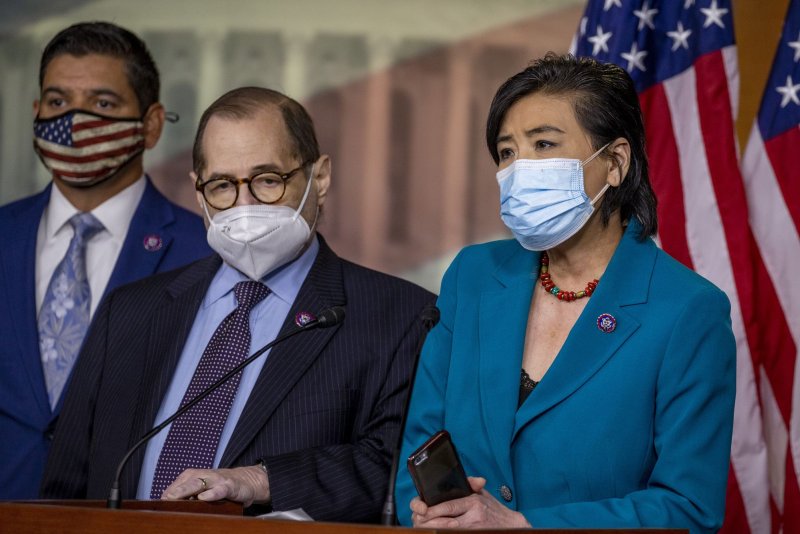1 of 4 | Chairman of the House Judiciary Committee Rep. Jerry Nadler, D-N.Y., and Rep. Judy Chu D-Calif, speak about the NO BAN Act in a news conference on Wedensday. Photo by Tasos Katopodis/UPI |
License Photo
April 21 (UPI) -- The House on Wednesday passed two pieces of legislation in response to former President Donald Trump's 2017 Muslim travel ban.
Lawmakers voted 218-208 in favor of the National Origin-Based Antidiscrimination for Nonimmigrants Act, also known as the NO BAN Act, which would limit a president's power to issue travel bans and alter current immigration law to prohibit discrimination based on religion.
They also voted 217-207 in favor of the Access to Counsel Act which ensures individuals who seek to lawfully enter the United States are able to contact a family member or adviser if they are held at a port of entry for an extended period of time.
Trump on Jan. 27, 2017, signed an executive order banning citizens from seven Muslim-majority countries from entering the United States. Following multiple changes to the order in response to federal court challenges, the State Department finally fully implemented the measure on Dec. 8, 2017, restricting entry of immigrants from Chad, Iran, Libya, North Korea, Syria, Somalia, Venezuela and Yemen with restrictions being "tailored to each country."
Rep. Judy Chu, D-Calif., who reintroduced the NO BAN Act in February, condemned the ban in a tweet on Wednesday.
"The Muslim Ban was always wrong, needless and cruel and failed to live up to the requirements laid out by the Supreme Court," she wrote. "Religious bans have no place in our country or our laws and today, we are voting to make sure this never happens again."
The measure strengthens the Immigration and Nationality Act to prohibit discrimination on the basis of religion and limits "overly broad" executive authority to issue future travel bans.
Rep. Tim McClintock, R-Calif., argued against the bill on Wednesday, saying limiting the president's power to implement travel restrictions hampers national security.
"The president's ability to protect against threats, negotiate security protocols and when necessary, to retaliate against discriminatory actions by other countries, depends on having this power at his immediate disposal," McClintock said.
The Center For American Progress praised the passage of the NO BAN Act in a statement Wednesday.
"Passage of the NO BAN Act is long overdue and will wipe away one of the biggest stains of the Trump administration's sustained -- literally from its first week in office -- anti-Muslim and anti-African discrimination and will ensure that no such abuses of immigration authority are not possible in the future," said Philip E. Wolgin, acting vice president of immigration policy at the Center for American Progress.
The Access to Counsel Act ensures U.S. citizens, green card holders and other individuals with legal status are able to consult with an attorney, relative or another interested party to seek assistance if they are detained by Customs and Border Protection for more than an hour at airports and other ports of entry.
"The urgent need for my Access to Counsel Act was on full display during four cruel years of a xenophobic Trump administration carelessly stripping basic civil rights and civil liberties away from individuals solely because of the color of their skin, their religion, the language they speak, or their country of origin," Rep. Pramila Jayapal, D-Wash., who introduced the bill, said in a statement.
Rep. Jerry Nadler, D-N.Y., said the ban caused "chaos" at airports as soon as it was announced in 2017.
"I can personally attest to that chaos, based on my experience at JFK Airport immediately after the ban was implemented," Nadler said. "Refugees, individuals with valid visas, and even lawful permanent residents were detained for hours and prevented from speaking with attorneys. Some even had their phones taken away and were unable to call their family."















